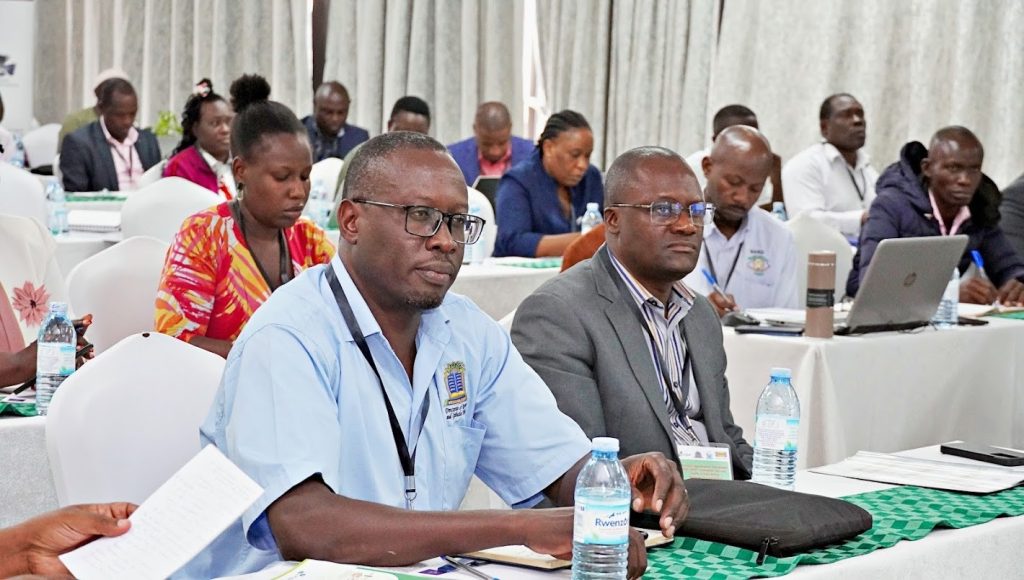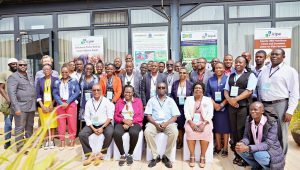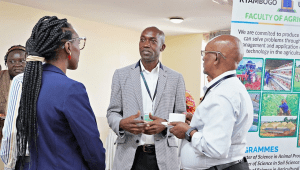The Faculty of Agriculture in collaboration with the International Centre of Insect Physiology and Ecology (icipe), and the National Agricultural Research Organisation (NARO) are holding a 2 days National workshop of the project “Scaling regenerative black soldier fly farming innovations with vegetable push-pull cropping systems for One Health in Rural Kenya, Rwanda and Uganda”, funded by the IKEA Foundation.
The objective of the project is to integrate and upscale black soldier fly farming with smallholder vegetable pushpull cropping for better agri-based livelihoods in East Africa.
The workshop is an opportunity to present the project objectives and activities, develop an implementation plan, and assign roles and responsibilities to project partners and stakeholders.
In Uganda, the project will be implemented in collaboration with Kyambogo University and National Agricultural Research Organization, extension agencies, non-governmental organizations, private sector partners in the Black Soldier fly farming sector, smallholder farmers practising Vegetable integrated push-pull, feed millers, waste aggregators and regulatory authorities in environmental management, standards and certification. The Project started on 1st February 2024 and will end by 30 October 2026.

The BSF-VIPPT Project description
The sub-Saharan Africa (SSA) region is at high risk of food insecurity given its dependence on cereal imports, the rapid rate of population growth and low subsistence-level agricultural productivity. Insect pests, parasitic weeds, diseases, low soil fertility and climate change increasingly constrain agricultural production. Nutrient-depleted and degraded soils lead to increased use of unaffordable and unsustainable inorganic fertilizers for soil fertility enhancement and pesticides for pest management. Pesticide misuse affects human health and the environment.
Consumption of low-value starch-rich staples contributes to malnutrition and hidden hunger. While vegetables can contribute to better nutrition and incomes for smallholder farmers, their production is limited by major pests and diseases, leading to indiscriminate and frequent use of synthetic pesticides, including highly hazardous pesticides, in their management.
This increases the production cost and seriously compromises the health of growers and consumers. The majority of farmers practice mixed farming, producing livestock and poultry as key sources of protein. More farmers are producing fish in ponds.


Lack of fodder, and affordable and nutritious feeds constrain livestock, poultry and fishes farmed by smallholders. Majority of rural households farm indigenous chickens, another key source of income and proteins. Similarly, the inland aquaculture sector in rural East Africa is rapidly growing, and the lack of affordable and nutritious feeds is a bottleneck in enhancing the productivity of both poultry and fish farmed by smallholders.
The Faculty of Agriculture in collaboration with the International Centre of Insect Physiology and Ecology (icipe), and the National Agricultural Research Organisation (NARO) will address these challenges with funding by IKEA Foundation to promote a new integrated BSF and VIPP innovation within the context of One Health and building on previous investments by icipe in research and development (R&D) in related domains.
Farming black soldier flies (BSF) harnessing the potential of a regenerative circular economy is an innovative strategy developed by the Insects for Food, Feed and Other Uses (INSEFF) programme of icipe. It recycles organic wastes into economically valuable products such as nutrient-rich protein feeds for poultry and fishes, and also organic insect-based frass fertilizers for improving crop productivity.
Scaling BSF farming innovations in rural Africa and its effective integration into diversified cropping systems that comprise the production of staple food crops with vegetables including village-level poultry and fish farming, can effectively: (i) ensure food and nutritional security of smallholders, and (ii) contribute to ‘One Health’ (human, animal, plant and environmental health) impacts. icipe`s flagship push-pull technology is a novel agroecological l cropping system that mitigates various insect pests, parasitic weeds and soil fertility constraints. It repels pests whilst recruiting their natural enemies. Simultaneously, the pest is lured away from the crop using peripheral trap plants as forage crops for improving milk yields.
This project will ensure a resilient, circular and regenerative food system for sustainable, agri-based livelihoods, and food and nutritional security of smallholder farming communities in rural Africa with the specific objective: To validate, promote and upscale black soldier fly (BSF) farming innovations and to integrate BSF farming with smallholder vegetable push-pull cropping systems for ‘One Health’ and better-agro based livelihoods in Kenya, Rwanda and Uganda.
Tags: agricultural innovation, agricultural workshop, black soldier fly, BSF farming, circular economy, East Africa, food security, icipe, IKEA Foundation, Kyambogo University, National Agricultural Research Organisation, nutrient-rich feed, One Health, organic fertilizers, rural development, sustainable agriculture, vegetable push-pull cropping
